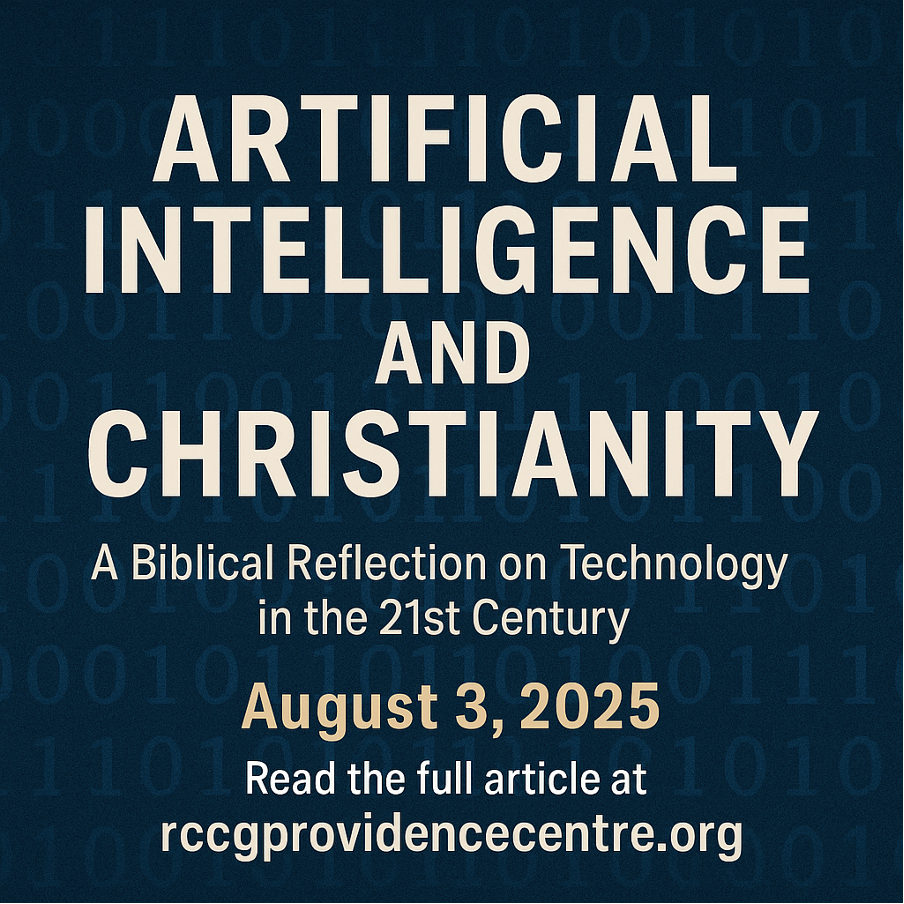Artificial Intelligence and Christianity: A Biblical Reflection on Technology in the 21st Century
Sunday School Summary | August 3, 2025

Introduction
In a time when artificial intelligence (AI) is transforming industries and redefining human interaction, Christians are increasingly faced with the challenge of discerning how to engage with such technology in a biblically grounded and spiritually sound manner. During the Sunday School session held on August 3rd, 2025, the topic “Artificial Intelligence and Christianity” was explored with depth and relevance, highlighting the diverse perspectives within the church on AI’s potential, its dangers, and its proper role in Christian life.
AI and Diverse Christian Perspectives
The congregation began by identifying a central need: not merely to understand what AI is, but to explore the implications of AI through a Christian lens. While the congregation was already familiar with the basics and benefits of AI, the focus shifted toward the more nuanced question: What does it mean to be a Christian in an AI-driven world?
Participants reflected on the spectrum of views within the Christian community. Some welcomed AI as a powerful tool for ministry and productivity, while others expressed caution, warning against its potential to displace God in the human heart. The aim was not to demonize AI, but to understand it responsibly.
Biblical Reflections on Technology
The Scriptures offer several precedents for human innovation and technological development. From the building of the Tower of Babel (Genesis 11:1–9) to the Spirit-filled craftsmanship of Bezalel and Aholiab (Exodus 31:1–11), the Bible affirms that technological capacity is a gift from God. However, these stories also highlight a tension: technology becomes dangerous when it is used to elevate human pride or substitute divine authority.
The pastor emphasized that the natural laws governing AI today were embedded in creation from the beginning. What we call “innovation” is, in fact, the discovery and application of God’s already-existing order. Therefore, technology must be understood as a stewarded gift—not a master to be worshipped.
AI's Potential and Pitfalls
AI imitates human intelligence and excels at tasks such as data analysis, language translation, and automation. While these abilities make AI an effective tool, the congregation warned against the tendency to idolise it. As observed, there is a risk that AI may subtly draw people’s attention away from God’s sovereignty, becoming the modern equivalent of the biblical “works of men’s hands” (Psalm 115:4).
Furthermore, the congregation addressed the fear that AI might become society’s caretaker—making decisions, guiding behaviour, and even replacing spiritual reflection. Such dependence can foster spiritual laziness, weaken discernment, and dull the voice of the Holy Spirit in daily decision-making.
AI as a Tool—Not a God
Participants were reminded that many historical inventions, such as the printing press or electricity, were initially met with suspicion but later embraced. What distinguishes AI is its “force multiplier” effect: it not only enhances productivity but also amplifies both the good and bad in society. This demands discernment. Just as money is not inherently evil but the love of money is (1 Timothy 6:10), AI is not inherently evil but becomes problematic when it dominates our affections or replaces trust in God.
The pastor emphasised the importance of adopting a mindset that positions AI as a tool to enhance creativity and service in God’s kingdom—not as an end in itself. Citing parallels with the golden calf in Exodus 32, he warned against projecting divine qualities onto man-made creations.
Christian Use Cases: AI for the Kingdom
Despite the cautionary tone, the session was not devoid of hope. AI can serve as a powerful ally in kingdom advancement. The pastor highlighted several constructive applications:
- Scripture study tools that provide instant cross-referencing and language insights.
- Language translation to support global evangelism.
- Online discipleship communities for prayer, learning, and encouragement.
- Ministry automation, including personalized training and follow-up for converts.
- Online worship enhancements, making remote services more impactful.
When aligned with Christian values and overseen with spiritual accountability, AI can serve as an agent of edification and outreach.
A Call to Discernment and Stewardship
In conclusion, the Sunday School discussion reminded us that Christian engagement with AI must be both thoughtful and theological. Technology in itself is neutral—it is the heart behind its use that determines its moral value. AI, like money, medicine, or machinery, must be handled with wisdom, humility, and a commitment to glorify God.
As we move deeper into an age defined by technological sophistication, the church must not retreat in fear nor rush in blindly. Instead, we are called to redeem technology—to use it for truth, justice, love, and the expansion of God’s kingdom on earth.
"So, whether you eat or drink or whatever you do, do it all for the glory of God." — 1 Corinthians 10:31





